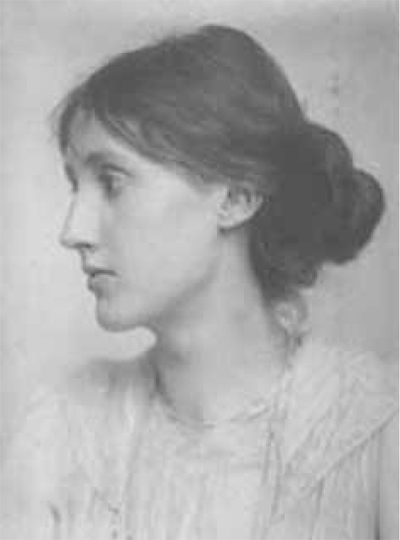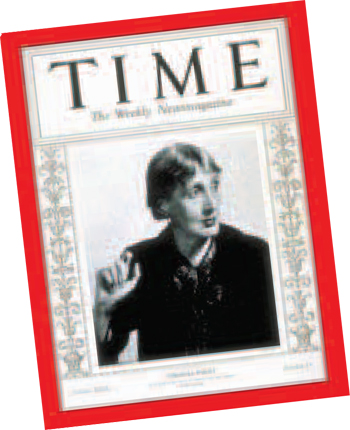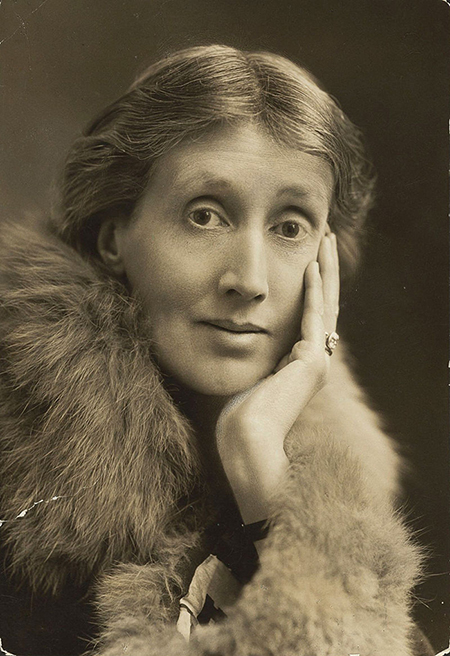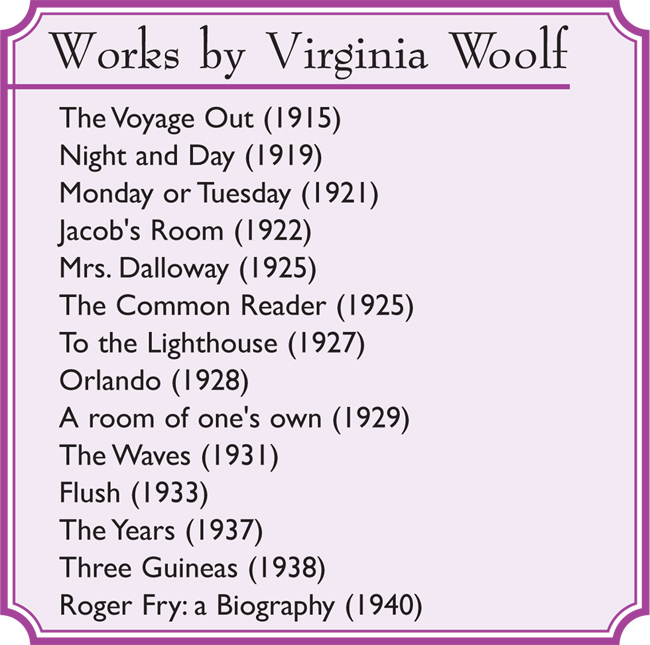
 Virginia Woolf's legacy is more than walking into a river, pockets filledwith rocks, ending her life. She was one of the greatest novelists in the twentieth century and one of the first "Modernist" writers. James Joyce and Woolf moved past the traditional story form of novels, popular in the Victorian era. Virginia's early books went beyond mere story telling and one plot. Her writing explored inside the character, using their inner dialogue, plus imagery, symbolism, and metaphor to achieve psychological effects. Instead of telling the reader what a character was like, her characters unfolded displaying feelings and thoughts. Employing a "stream of consciousness" a reader can hear the continuous thoughts flowing through the mind of the character.
Virginia Woolf's legacy is more than walking into a river, pockets filledwith rocks, ending her life. She was one of the greatest novelists in the twentieth century and one of the first "Modernist" writers. James Joyce and Woolf moved past the traditional story form of novels, popular in the Victorian era. Virginia's early books went beyond mere story telling and one plot. Her writing explored inside the character, using their inner dialogue, plus imagery, symbolism, and metaphor to achieve psychological effects. Instead of telling the reader what a character was like, her characters unfolded displaying feelings and thoughts. Employing a "stream of consciousness" a reader can hear the continuous thoughts flowing through the mind of the character.
The three novels, MRS.DALLOWAY, THE LIGHTHOUSE, and THE WAVES, are most often considered her greatest claims to fame. She published ORLANDO, inspired by one of her lovers. Presentations she delivered to women at Cambridge in 1928, inspired her writing explored. A ROOM OF ONE’S OWN, which focused on women's rights. Some called her a feminist, but she preferred the term "humanists."
 Virginia and her sister studied the classics and English literature in the family's immense library of their London home. Virginia decided early she wanted to be a writer. Her sister trained to be an artist. It is now believed that Virginia's mental problems were likely inherited and exacerbated by sexual abuse she and her sister suffered at the hands of their older stepbrothers from her mother's first marriage. When Virginia was 13, her mother suddenly died from influenza. Her half-sister Stella, who had taken over the duties of running the family, died two years later which led to the first of Virginia's several nervous breakdowns.
Virginia and her sister studied the classics and English literature in the family's immense library of their London home. Virginia decided early she wanted to be a writer. Her sister trained to be an artist. It is now believed that Virginia's mental problems were likely inherited and exacerbated by sexual abuse she and her sister suffered at the hands of their older stepbrothers from her mother's first marriage. When Virginia was 13, her mother suddenly died from influenza. Her half-sister Stella, who had taken over the duties of running the family, died two years later which led to the first of Virginia's several nervous breakdowns.
Some hypothesize the deaths of the two older women left Virginia and Vanessa vulnerable to the abuse of the stepbrothers. Seven years later her father's death led to her most alarming collapse. She was briefly put into an institution. Woolf was plagued by recurring depressive periods and drastic mood swings throughout her life. These periods affected her social functioning but were not detrimental to her literary abilities. Lately, using modern diagnostics, it has been theorized she was suffering from Bi-polar Disorder.
After their father's death in 1904 and her second serious breakdown she, and her sister Vanessa and one of their brothers, sold the huge house where they had lived as youths and bought a house at 46 Gordon Square in Bloomsbury. There they began the BLOOMSBURY GROUP, an intellectual circle of friends the brothers had met at Cambridge. One of the members of this group was Leonard Woolf, whom Virginia later married. They were married from 1912 until her death in 1941. Leonard was a writer, civil servant, and a political theorist.He was the only member of the Bloomsbury Group that wasn't from the closely-knit English intellectual class, and he was Jewish, which added some needed diversity.
Many in the Bloomsbury Group became accomplished and famous. Leonard seemed an ear for listening with the willingness to be confidant. As Virginia wrote, "All men confide in Leonard - especially such as love their own sex." The Bloomsbury Group was far ahead of their time in acceptance of sexual diversity. Virginia had several extra-marital affairs - predominantly with other women. Leonard showed no overt jealously, but on one occasion wrote a note to Virginia's lover of four years admonishing her for keeping her up too late and alluding to the ill affects it could have on Virginia's mental state. Throughout their marriage Leonard remained protective of Virginia's mental health. He believed she was the only true genius he had ever met.
 Some theorize her novels would never have been written without Leonard as a steadying influence. His devotion to her mental stability also motivated their founding of Hogarth Press in 1917. Starting a printing press was a manual and bookish diversion for Virginia when she wasn't writing. She self-published much of her writing through Hogarth Press as well as other note worthy writers, including translating Dostoyevsky, and being Sigmund Freud's publisher in England.
Some theorize her novels would never have been written without Leonard as a steadying influence. His devotion to her mental stability also motivated their founding of Hogarth Press in 1917. Starting a printing press was a manual and bookish diversion for Virginia when she wasn't writing. She self-published much of her writing through Hogarth Press as well as other note worthy writers, including translating Dostoyevsky, and being Sigmund Freud's publisher in England.
The period between the first and second World Wars was a difficult time for everyone in Europe. Virginia became despondent. Some friends kept poison handy in case the Germans succeeded in invading England. Since Leonard was Jewish, he and Virginia did as well.Later it was discovered, the Germans included them on an "arrest list." Bombers flew over their home in the country. At the end of 1940, Virginia experienced another severe episode of depression. She didn't believe she could recover. On March 28, 1941, at the age of 59, she filled her pockets with stones and drowned herself in the River Ouse, near her Sussex home. She left a suicide note for Leonard and one for her sister Vanessa.
Although it might appear Virginia was consistently a difficult companion, those who knew her described her as physically beautiful, often jovial, and a wonderful conversationalist. She was unquestionably, extremely intelligent,and talented. Although most sources consider Leonard as a steadying and nurturing effect on Virginia's life, a current book states that Leonard's treatment of her encouraged her ill health and was ultimately responsible for her death. Others report that he was insensitive to the dramatic effects sexual abuse may have contributed to her condition. It is impossible to know what truly transpires within relationships. He was devoted and stayed with her throughout her difficult periods and his gardening passion and attention to minute details of all their expenditures, seemed to have a quieting affect on Virginia. Leonard lived twenty-eight years after her death and continued his writing.
Virginia is portrayed in Michael Cunningham's 1998, Pulitzer Prize winning novel, THE HOURS, and the 2002 film adaptation of the book. Her story intertwines with one of two other women, using one of Woolf’s characteristic stylistic methods – manipulating time. Virginia was portrayed in the process of writing Mrs. Dalloway, who is planning a party. The other two women decades later, are planning a party as well. A fun project is to read the book (it’s short) followed by watching the movie. Nicole Kidman won an Oscar for her portrayal of Virginia.
The play, WHO’S AFRAID OF VIRGINIA WOOLF, has nothing to do with Virginia.The author Edward Albee asked Leonard Woolf permission to use her name. Today, in the Bloomsbury area of London, one can stroll through the park where she and the infamous group lived, walked, and discussed matters of the world. There is a bust of Virginia in this lovely park setting.
